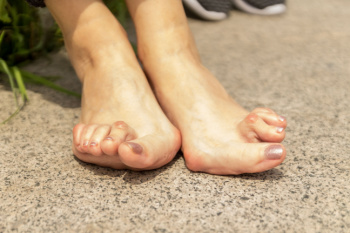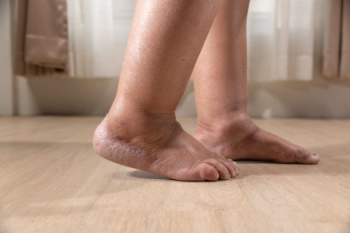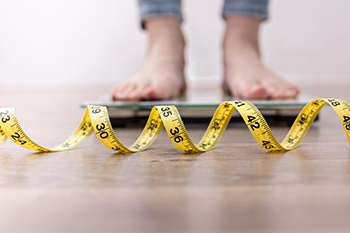
Rheumatoid arthritis, or RA, is an autoimmune condition that causes inflammation in the joints, often beginning in the smaller joints such as those in the feet. In its early stages, rheumatoid arthritis may cause subtle symptoms that gradually worsen over time. Individuals might notice stiffness in the feet, particularly in the morning or after long periods of rest. Swelling surrounding the toe joints or the ball of the foot may also develop, accompanied by warmth and tenderness. Pain can be constant or may come and go, making walking uncomfortable. As the condition progresses, joint function can be affected, leading to changes in foot shape. If you have joint pain and stiffness in your feet, it is suggested that you are under the care of a podiatrist who can offer appropriate relief and treatment remedies.
Because RA affects more than just your joints, including the joints in your feet and ankles, it is important to seek early diagnosis from your podiatrist if you feel like the pain in your feet might be caused by RA. For more information, contact one of our podiatrists of Princeton Foot and Ankle Associates. Our doctors will assist you with all of your podiatric concerns.
What Is Rheumatoid Arthritis?
Rheumatoid Arthritis (RA) is an autoimmune disorder in which the body’s own immune system attacks the membranes surrounding the joints. Inflammation of the lining and eventually the destruction of the joint’s cartilage and bone occur, causing severe pain and immobility.
Rheumatoid Arthritis of the Feet
Although RA usually attacks multiple bones and joints throughout the entire body, almost 90 percent of cases result in pain in the foot or ankle area.
Symptoms
- Swelling and pain in the feet
- Stiffness in the feet
- Pain on the ball or sole of feet
- Joint shift and deformation
Diagnosis
Quick diagnosis of RA in the feet is important so that the podiatrist can treat the area effectively. Your doctor will ask you about your medical history, occupation, and lifestyle to determine the origin of the condition. Rheumatoid Factor tests help to determine if someone is affected by the disease.
If you have any questions please feel free to contact our offices located in Princeton, and West Windsor, NJ . We offer the newest diagnostic and treatment technologies for all your foot and ankle needs.

Swollen ankles are often caused by a buildup of fluid in the soft tissues, known as edema. This can develop for many reasons, including standing or sitting in one position for too long, consuming high amounts of salt, being overweight, pregnancy, or taking certain medications. Swollen ankles may also result from an ankle sprain, infection, insect bite, or more serious conditions involving the heart, kidneys, or liver. Symptoms can include puffiness around the ankles and feet, shiny or stretched skin, skin discoloration, and discomfort or stiffness. In some cases, pressing the skin may leave a dent. A podiatrist can perform a detailed exam to determine whether the swelling is linked to an injury, circulation problem, or another medical condition. Depending on the cause, treatment may involve reducing inflammation, draining excess fluid, prescribing medication, or correcting biomechanical issues with the foot or ankle. In severe or persistent cases, surgery may be recommended to resolve structural or vascular concerns. If you have swollen ankles, it is suggested that you schedule an appointment with a podiatrist for an exam, diagnosis, and appropriate treatment.
Swollen feet can be a sign of an underlying condition. If you have any concerns, contact one of our podiatrists of Princeton Foot and Ankle Associates. Our doctors can provide the care you need to keep you pain-free and on your feet.
Swollen feet are a common ailment among pregnant women and people who stand or sit for extended periods. Aging may increase the possibility of swollen feet and patients who are obese often notice when their feet are swelling too. There may be medical reasons why swollen feet occur:
- Phlebitis - A condition that causes the veins to become inflamed and can also cause leg pain.
- Liver disease - This may lead to low blood levels of albumin which is a protein. This can cause fluid in the blood to pass into the tissues and several areas of the body can become swollen.
- Heart failure - When the heart doesn’t pump properly the blood that is normally pumped back to the heart can pool in the veins of the legs causing swollen feet.
- Kidney disease - One of the main functions of the kidneys is releasing excess fluid in the body. This type of condition can make it difficult for the kidneys to function properly, and as a result the feet may become swollen.
- Deep-vein thrombosis (DVT)- This is a serious condition where blood clots form in the veins of the legs. They can block the return of blood from the legs to the heart which may cause the feet to swell. It is important to be treated by a podiatrist if this condition is present.
Swollen feet can also be caused by bone and tendon conditions, including fractures, arthritis, and tendinitis. Additionally, there may be skin and toenail conditions and an infection may cause the feet to swell. Patients who take medicine to treat high blood pressure may be prone to getting swollen feet.
Many patients elevate their feet to help relieve the swelling and this is generally a temporary remedy. When a podiatrist is consulted the reason behind the swelling can be uncovered and subsequently treated.
If you have any questions please feel free to contact our offices located in Princeton, and West Windsor, NJ . We offer the newest diagnostic tools and technology to treat your foot and ankle needs.

Excess body weight can lead to foot pain by placing continual pressure on the feet, toes, and ankles. People with a higher body mass index, or BMI, are more likely to experience conditions like plantar heel pain, flat feet, and limited ankle movement. Extra fat mass also has been shown to affect foot posture, often leading to a low arch and increased pronation while walking. This altered foot function increases pressure on the bottom of the foot, especially under the heel and midfoot, often resulting in ongoing pain. Such changes can make walking or standing for long periods more difficult and may contribute to joint strain. A podiatrist can evaluate the structure and function of your feet, recommend ways to relieve discomfort, and discuss options if the pain becomes severe or persistent. If you have foot pain that may be connected to your weight, it is suggested that you schedule an appointment with a podiatrist for an evaluation and treatment.
Obesity has become very problematic at this point in time and can have extremely negative effects on the feet. If you’re an obese individual and are concerned about your feet, contact one of our podiatrists from Princeton Foot and Ankle Associates. Our doctors can provide the care you need to keep you pain-free and on your feet.
Obesity and Your Feet
Since your feet are what support your entire weight when standing, any additional weight can result in pain and swelling. Being overweight is one of the main contributors to foot complications.
Problems & Complications
Extra Weight – Even putting on just a few extra pounds could create serious complications for your feet. As your weight increases, your balance and body will shift, creating new stresses on your feet. This uneven weight distribution can cause pain, even while doing the simplest tasks, such as walking.
Diabetes – People who are overweight are at serious risk of developing type-2 diabetes, which has a drastic impact on the health of your feet. As you get older, your diabetes might worsen, which could lead to loss of feeling in your feet, sores, and bruises. You could also become more prone to various infections.
Plantar fasciitis – Pressure and stress that is placed on muscles, joints, and tendons can trigger plantar fasciitis, which is an inflammation of tissue that forms along the bottom of the foot.
If you have any questions please feel free to contact our offices located in Princeton, and West Windsor, NJ . We offer the newest diagnostic and treatment technologies for all your foot and ankle needs.

